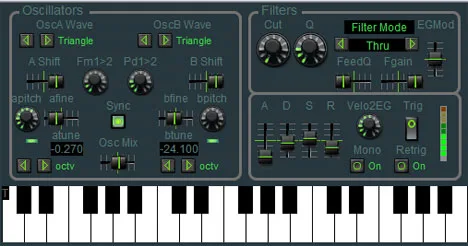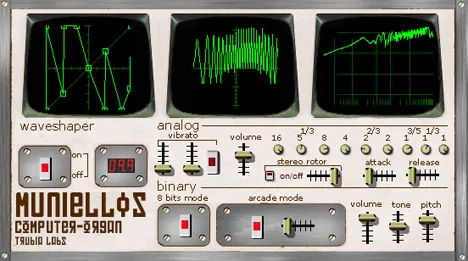In the world of virtual instruments, where innovations rapidly replace each other, it’s sometimes worth paying attention to the classics that laid the foundations. FKnock from MVX Synths is just such an example. Developed in 2005, this plugin is an interesting synthesizer that builds on the ideas of its predecessor ANX1, but adds a powerful element to this formula – filters. This is not just another synthesizer; it’s a “filter synth,” an instrument where the sound filtering process is the central element in shaping the timbre and character of the sound.
What is FKnock?
FKnock was conceived as a synthesizer in which filters play a key role in sculpting the sound palette. In the era of digital plugins of the early 2000s, developers were actively experimenting with different approaches to creating virtual instruments. MVX Synths in 2005 decided to combine ideas from their previous instrument ANX1 with an emphasis on dynamic and expressive filtering. The result was FKnock – a synthesizer that allows the user to deeply immerse themselves in the world of tonal transformations through a variety of filtering mechanisms.
Unlike many synthesizers, where the filter is just one of the stages of the sound chain, in FKnock it is likely integrated more closely with oscillators and modulation sources. This means that filtering does not just “smooth” or “cut off” the sound, but actively participates in its birth and evolution. This approach opens up wide possibilities for creating unique, moving, and expressive timbres that can change and develop over time.
Features and capabilities
Given the focus of the plugin, it can be assumed that its key features revolve around the filter section and its interaction with other synthesizer components. Although detailed information about the plugin’s structure is not provided, the concept of a “filter synth” and the use of ideas from ANX1 allows us to make some assumptions about its capabilities:
- Advanced filtering capabilities: FKnock likely offers more filter types (low-pass, high-pass, band-pass, notch) and/or more flexible control parameters compared to standard synthesizers of the time. Perhaps there are different filter operating modes, modulation of filter parameters from LFO, envelopes or other sources.
- Interaction of oscillators and filters: The integration of filters with oscillators may mean that filters can affect the sound generation process itself or have a closer connection with the oscillator parameters, allowing you to create unique synergies between the sound source and its filtering.
- Sound characteristic of the era: Being a development of 2005, FKnock likely carries a certain sound character typical of digital VST instruments of that era. This can be both an advantage (for getting a vintage digital timbre) and a feature that should be taken into account.
- Simplicity and intuitiveness: Many plugins of the early 2000s sought to be as clear and easy to use as possible. It is quite possible that the FKnock interface is quite simple, allowing you to quickly master its capabilities and focus on sound creation.
Who is this plugin for?
FKnock may be of interest to a wide range of musicians and sound designers, in particular:
- Electronic music producers looking for unusual timbres and sounds for their tracks.
- Musicians experimenting with sound and striving to create unique textures and atmosphere.
- Sound designers who need a tool to create moving, evolving sounds and effects.
- Fans of vintage digital sound and VST plugins of the early 2000s.
- Users working in 32-bit hosts on Windows.
Technical details
The plugin is available in VST format and is designed for Windows operating systems (32-bit). It is important to consider compatibility with your music software.
Overall, FKnock is an interesting artifact from the history of VST plugins, which can still find its place in the arsenal of a modern musician. Its “filter synth” concept offers a fresh look at sound formation, and its vintage digital character can add unique shades to your music. Try FKnock if you are ready to dive into the world of experimental filtering and discover new sound horizons.



